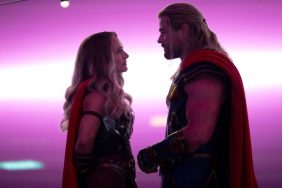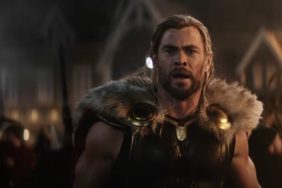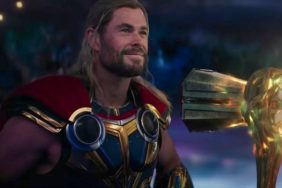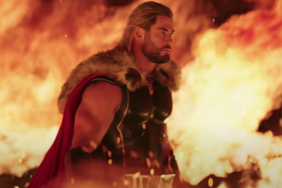Terror usually lives within the unknown. I don’t mean fight-or-flight terror, the type you feel if a bear is charging down on you. That’s instinctual, you’re programmed with that from birth. I’m talking fear, the kind that grips you in its icy fingers and causes all your intellectual faculties to collapse. That kind of terror usually comes with shadows, the unknown, a fear that we don’t understand. I was hoping writer Jason Aaron would maintain that enigma for Gorr The God Butcher. Aaron had other plans.
Thor: God Of Thunder #6 isn’t a hack job or even poorly written, it just takes the power away from Gorr. Until now the god killer was just a whispered terror, a force that hated any form of deity and looked to sacrifice them all. His methods were cruel, his tactics sadistic and he reasons were his own. With issue #6, Aaron strips that away by giving us the complete background on Gorr and how his hatred of the gods was born.
I will give Aaron this, he really does stack enough tragedy on Gorr that you can understand his quest. Six opens with Gorr as a child wandering the wastelands of his planet with his mother. Gorr is already questioning why the gods would let him, his mother and his people go hungry. Mother Gorr tells her son not to question the gods, that they provide and always will. Suddenly, Sand Tigers (bad name) attack and kill Gorr’s mother.
Jump ahead a few years. Gorr is a husband and father with another child on the way. He still rails against the poor living conditions and questions why his people believe in their gods. Gorr’s wife comforts him and, like his mother, sings the praises of the gods. As she finishes her speech, the rocks she’s sitting on crumble and fall, killing her and Gorr’s unborn child. A few years later, Gorr is forced to bury his only son after watching him starve to death. Gorr’s people are aghast that he would place the boy in the ground as opposed to hanging him from a tree for the Gods to notice. Gorr reveals he has neither love nor belief anymore in the gods. His people promptly drive him out. The final straw are two battling gods who crash to Gorr’s planet. Gorr slaughters one, and a power is transferred to him, allowing him to leave his planet and begin his quest to slaughter.
While all very dramatic, Aaron has made Gorr into something simplistic. If his wrath is never understood, if his reasoning remained something we had to guess at, then Gorr endures as terrifying. Now, he’s just the product of a long line of easy and clichéd events. Losing mother, wife, unborn child and only son? It reads more like the script of a brainless Jason Statham movie. I also found it a little eye rolling that each tragedy happened right after a speech about the grace of the gods.
Aaron ends issue #6 in a confusing way. I’m not sure if Gorr had another child or if something else is happening. It’s a shock and awe ending that works, but it just isn’t particularly clear. Aaron also continues to not understand how to bring a story arc to its close. The fight between Gorr and Thor should have happened on some level by now. Issue #5 could have been that ,with six the continuation, and then resolution coming with issues #7 and maybe #8. Instead, Aaron shoehorns in this unnecessary backstory that wipes away the essence of what made Gorr such a good villain.
Catching Aaron’s story in the safety net of wonderful art is Butch Guice. Issue #6 is rife with alien worlds and new places for Guice’s eloquent and dark pencils to bring to life. The detail work in what Guice can do is astounding. The scene where Gorr is torturing Volstagg is a prime example. The rips, scars and wounds all over Volstagg are so well done that you can feel them. Guice continues to work well with shadow here and with human faces. He has an understanding of flow that is almost cinematic.
Tom Palmer’s inks help add depth to Guice’s pencils. Palmer knows when to use a lighter touch with inking, such as looks of pain or sadness on faces. He then ratchets it up when action is involved. His heavy inking of Gorr helps keep Thor’s nemesis both powerful and scary. I was also impressed with Ive Svorcina’s colors. Issue #6 takes place mostly on a desert planet and a dark cave, so Svorcina had a limited palette to use, but chooses hues well and blends them perfectly. The colors never overpower the story but they’re never muddled either.
Thor: God Of Thunder #6 is gorgeous to look at but story wise does a serious disservice to a wonderful new enemy.

(4 Art, 2.5 Story)








